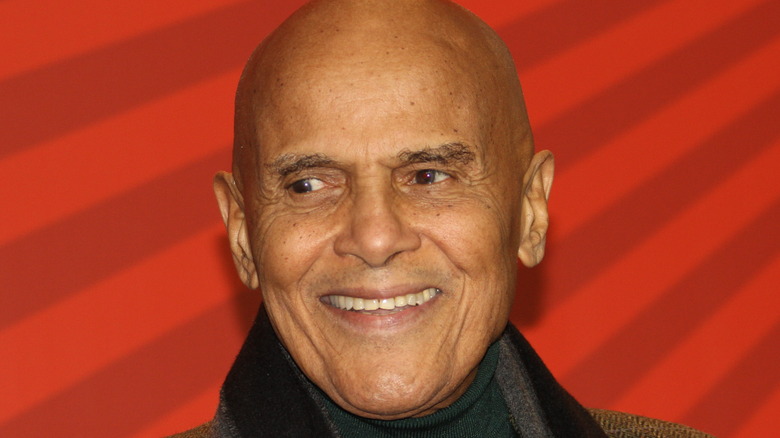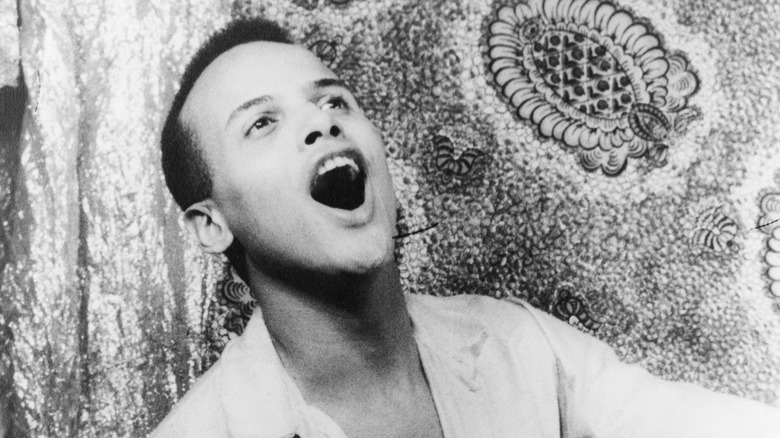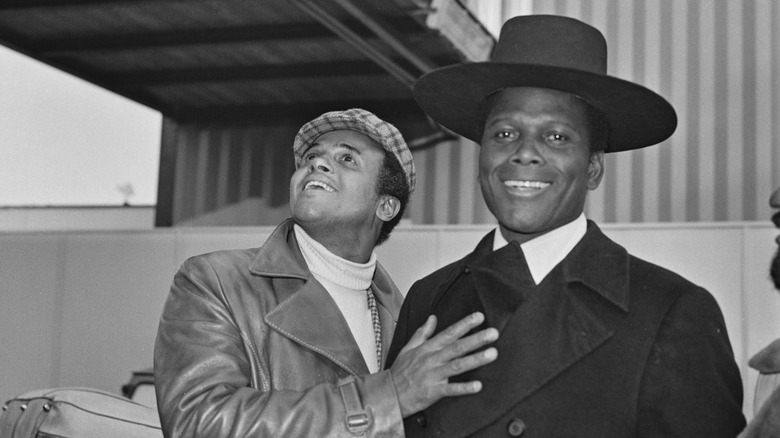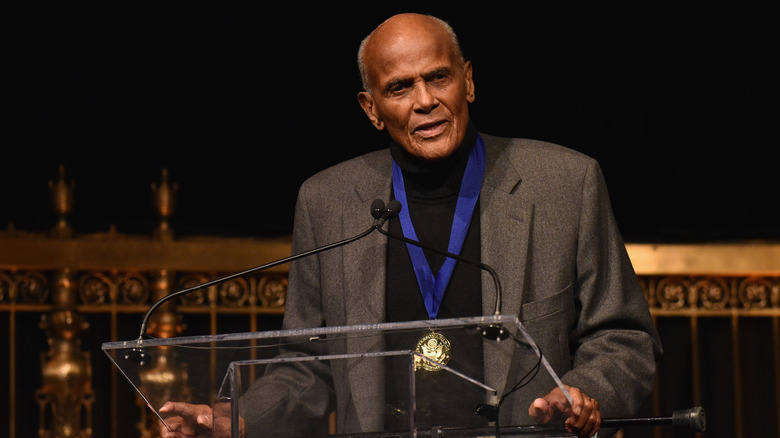The Heart-Wrenching Death Of Harry Belafonte
Singer, actor, and activist Harry Belafonte died on April 25, 2023, at the age of 96 (via The New York Times). A man of many talents, he was known as the "King of Calypso" — his 1956 album "Calypso" was the first LP to sell over a million copies, per AllMusic, and the song "Day O (The Banana Boat Song)" continues to be popular over 70 years after its release. In 1957, according to Turner Classic Movies, Belafonte made history once again when he became the first Black Emmy winner for his album "Tonight with Belafonte (The Revlon Revue)." He was also a movie star with lead roles in "Carmen Jones" and "Island In The Sun," to name a few.
Belafonte was famously an early supporter of the civil rights movement; he was a friend, patron, and confidante of Martin Luther King, Jr. and stayed active in political and humanitarian causes throughout his life.
Belafonte introduced calypso music to American popular culture
Harold George Bellanfanti Jr. was born in Harlem, New York on March 1, 1927. His parents were both born in Jamaica, and young Harry spent part of his childhood living there with one of his grandmothers. When he returned to New York as a teenager, he attended and dropped out of George Washington High School, joined the navy, and served in World War II.
Per Biography, Belafonte returned to New York after World War II and became interested in acting after attending a performance at the American Negro Theater. He volunteered as a stagehand in order to take classes there, and also went on to study at Erwin Piscator's Dramatic Workshop. Sidney Poitier also got his start at the American Negro Theater and once served as Belafonte's understudy in a performance. A role in which Belafonte sang caught the attention of agent Monte Kay, who offered him a regular gig at the Royal Roost jazz club. Backed by such greats as Charlie Parker and Miles Davis, he was a popular act.
Harry Belafonte branched out
In the early 1950s, he discovered folk music and abandoned his straight pop vocals to concentrate on songs from the Library of Congress' American folk songs collection as well as West Indian music, as reported by AllMusic. In 1953, he released his first album, "Mark Twain and Other Folk Favorites," which included songs from English, Scottish, West Indies, and African-American traditions.
That same year, he had a Tony-award winning role in the Broadway musical revue "John Murray Anderson's Almanac" and made his film debut playing a school principal in the movie "Bright Road," opposite Dorothy Dandridge. He and Dandridge reunited a year later in "Carmen Jones," an all-Black version of the classic opera "Carmen." In 1956, Harry Belafonte had two No. 1 albums, "Belafonte" and "Calypso," which introduced Afro-Caribbean calypso music, a style native to Trinidad and Tobago, to most of the United States for the first time.
From star of stage and screen to civil rights activist
In 1957, Belafonte returned to the silver screen with the controversial "Island in the Sun," in which his character and a white character played by Joan Fontaine contemplated a love affair, followed by 1959's "Odds Against Tomorrow," in which he played a bank robber working with a racist white accomplice. He closed out the 1950s with two hit live albums, "Belafonte at Carnegie Hall," which spent over three years on the pop charts, and "Belafonte Returns to Carnegie Hall." He released his last Top 40 album in 1964, "Belafonte at the Greek Theatre," per AllMusic.
As reported by Biography, Belafonte met Martin Luther King, Jr. in the 1950s and the two became friends. Belafonte participated in numerous rallies, protests, and marches. He used his celebrity to bring attention to the civil rights movement as well as provide financial support to individual activists, the Southern Christian Leadership Conference, the Student Nonviolent Coordinating Committee, and more. Per the Martin Luther King, Jr. Research and Education Institute, Coretta Scott King once said of Belafonte "Whenever we got into trouble or when tragedy struck, Harry has always come to our aid, his generous heart wide open." Belafonte was the executor of King's estate and chaired the Martin Luther King, Jr., Memorial Fund.
In the 1970s, per Biography, Belafonte teamed up with Sidney Poitier for two films, "Buck and the Preacher" (above) and "Uptown Saturday Night." He appeared on numerous television shows, including "The Muppet Show," and teamed up with Lena Horne for a one-hour TV special.
I will be a part of that legacy until the day I die.
Harry Belafonte continued making records and movies sporadically throughout the 1980s and 1990s; per The New Yorker, in 2017, Sony Legacy released "The Legacy of Harry Belafonte: When the Colors Come Together," an anthology that highlights the popularity and importance of his influence as a folk music artist. In addition to his support of the Americal civil rights movement, Belafonte's activism included African famine relief (he helped organize the 1985 USA For Africa recording of "We Are The World"), anti-apartheid work, HIV/AIDS treatment and prevention, education, and abolishing nuclear weapons.
In a 2018 interview with CBS News, when asked about the Martin Luther King Jr. quote, "The arc of the moral universe is long, but it bends towards justice," and just where society stood in terms of its arc, he replied, "Where we've always been. Consumed by racism. Consumed by the greatest single fault in the cultural DNA of America. I realized early on that beyond my art and my other sets of platforms, nothing was ever going to remove me from the permanent struggle of race."
He went on to discuss the work of Bobby Kennedy and King and said, "Had those men survived, we would be in a very different place. But they didn't. But they left us this legacy, and I will be a part of that legacy until the day I die." Harry Belafonte is survived by his wife Pamela Frank, his children Adrienne, Shari, David, and Gina, and five grandchildren.




